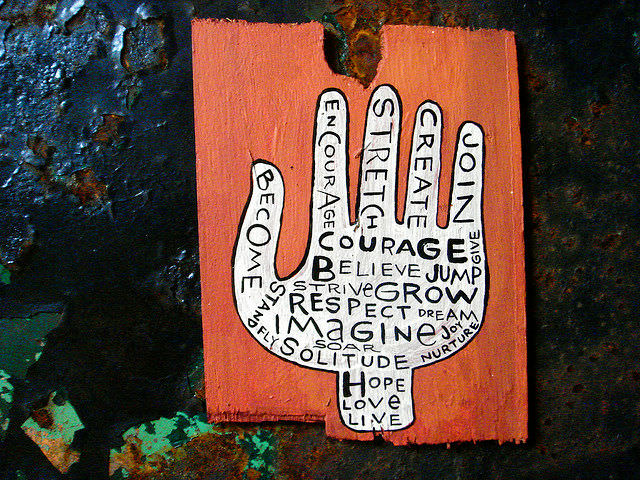“It takes courage to grow up and become who you really are.” ― e e cummings
Courage doesn’t belong just to the brave or the leaders or the young. Courage belongs to you. You don’t need to wear your courage on your sleeve, either. Courage is you living your life fully and from your heart.
We all want to be courageous. Particularly as we get older and it gets harder.* If we let it, over time fear will bully us into a corner. We see it happen in others.
Fear encroaches when we’re not paying attention. As we get older we see how life can treat some very unkindly. We see people we care about struggle and fall. Sometimes they have the strength and resilience to get up again stronger. But sometimes they don’t and that’s hard to watch. It makes us afraid that we might lack strength at some important time.
Pema Chodron, a witty and kind Buddhist nun, gives voice to a common fear about fear in her audio book, Don’t Bite the Hook. She talks about not wanting to be that uber-sensitive person who hasn’t worked with the discomfort of pushing back on fear. They complain all day about the noise, the heat, the food. With her gentle humour she describes someone we’ve all known — the person, young or old, whose life get smaller as more irritates and frightens them.
How do we stand up to fear?
By the intentional persistent practice of courage.
A moment for practice comes when you’re standing at the intersection of fear and your values. You are called to take a risky action for something you believe in, despite being afraid of what might happen. The risk may be big – like your physical safety – or it may be smaller – failing in the eyes of someone important to you. When you call on your courage you are showing that you are willing to face fear for something important.
Your biggest bang for the fear-busting buck comes in the areas that hold the most value to you. Perhaps love or self-expression, freedom or fairness. There are many worthy beneficiaries of your courage.
By contrast, bravery happens when you fearlessly take risky action that has value. We see people do something brave and they say that anyone would have done it. Recklessness happens when you fearlessly take risky action that has no value. No glory there.
Fear can be big or small. You recognize that familiar feeling when it rises up. Your nervous system can’t really distinguish between a “real” fear that comes from outside (like a snake) and an “anxious” fear that comes from inside (the worry that you might meet a snake along your way). Both fears are real to your mind and body and they have the same physiological effects. Of course, your bigger fears will have a bigger effect. But it’s the small constant fears that take the bigger toll over time.
Dance with Fear
Practicing courage is not a linear thing. It’s easier to think of it as a dance, a choreographed back and forth that circles in many directions. If you’re tired and you haven’t taken good care of yourself it is much harder to take the lead with fear. Big fears that bubble up from places you don’t understand are hard to work with. Be very kind and patient with those.
Learning to lead the dance is worthy of your time. As Maya Angelou said, “Courage is the most important of all the virtues because without courage, you can’t practice any other virtue consistently.”
Here are some ideas to find a rhythm with fear as you build your courage.
- Pick an important area to practice small acts of courage. Be selective about practicing courage in other areas. Don’t overload yourself.
- Set up at least one place of extreme self-care. Regularly do something that makes you feel really pampered, comfortable and safe. Do more things that you’re really good at to get the satisfaction of a job well done.
- Keep up your exercise.
- Stay connected. Share what you’re doing with select people. If you can, find a small group of people who are being very courageous and hang out with them. Share your wins with them.
- Visualize some small steps you will take to be courageous. Celebrate when you take the steps. Change your story about the fear.
- Use mindfulness practices to give the fear some space. Try to quiet your mind and breathe through the body sensations of fear. Don’t worry if this is difficult at the beginning. It gets easier with practice.
* We’ll never really get to a cranky dotage as we’ll always be fabulous and youthful. But let’s entertain for a moment that we will eventually slow down.
Image: Courage and hope by Denise Carbonell under CC2.0
If you enjoyed this post, please share it with your friends!

